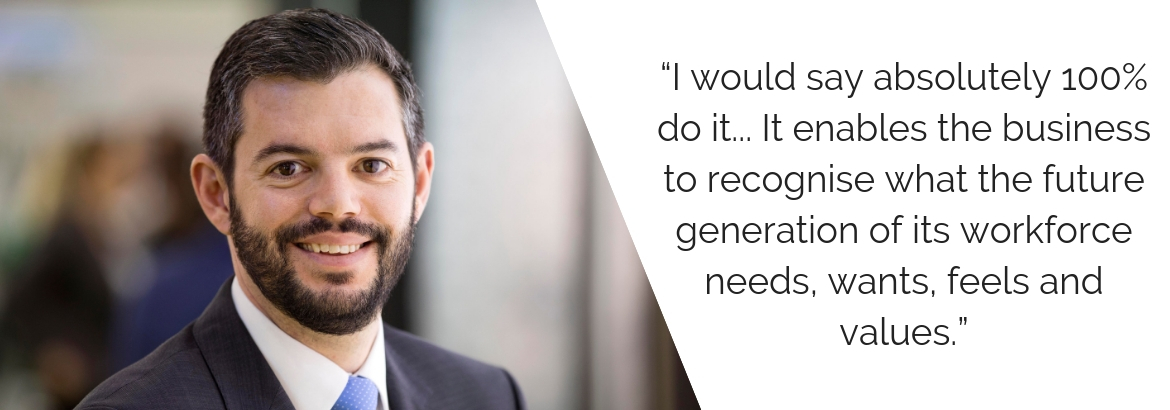Most people will be familiar with the concept of mentoring; it involves a seasoned executive sharing experience and knowledge with an often younger and often less experienced colleague.
But in today’s ever-changing, innovation-driven world, businesses such as Microsoft and Virgin are changing it up by having younger employees guide senior members of the team. The process is called reverse mentoring, and Reed Exhibitions – IBTM’s parent company – has embraced the concept wholeheartedly.
While older workers still have plenty of highly-valuable insights that will help steer the future direction of their organisation, some lack a deep understanding of the needs of younger generations (Millennials and Gen Z) and struggle to keep up with the way they are using technology.
Reverse mentoring seeks to solve this disparity by coaching senior executives on what the workplace should be like, what drives younger talent, and how to best utilize technology.
‘Mentee’ – Shane Hannam, Portfolio Director, IBTM Events
Shane Hannam, sees huge benefits in the reverse mentor programme initiated at Reed. Speaking as a reverse mentee, he comments,
“I was really impressed by how it worked. Younger employees mentored the senior leadership team on how they felt about working in the business, what they felt about our strategy, what they felt the business did well, what it needed to improve upon. I felt it was a really good connection to make with some of the emerging talent in our business.”
Shane continues, “I was particularly fascinated by the ways they use technology and the ways in which they would engage, as that is a strong indication of how the senior leaders of the future of our industry will be engaging with our brands.”
Shane’s reverse mentoring match was a sales executive from another division of the business. The pairing was an opportunity to talk about how things were managed in other areas of the business, and how different brands and shows approach certain elements of what they do.
As Portfolio Director, with responsibility for implementing strategies that ensure his shows remain engaging, appealing and successful, Shane felt that the reverse mentoring was an invaluable resource for gleaning new ideas and innovations and quickly being able to explain them to others with confidence.
Shane recommended all businesses should go ahead and implement a reverse mentoring programme, “I would say absolutely 100% do it. It’s hugely valuable, hugely informative, and hugely beneficial for both parties. It enables the business to recognise what the future generation of its workforce needs, wants, feels and values.”
Mentor – Amy Cunnington, Senior Sales Executive, Infosecurity Group
For the reverse mentors, the prospect of one on one time with a senior member of the team and the expectation that you should teach them something of value is, unsurprisingly, daunting for some.
However, Amy Cunnington, who reverse mentored B2B Divisional Director, Kerry Prince, explained why it shouldn’t be;
“The idea of mentoring our Divisional Director was somewhat intimidating, especially as we didn’t know each other too well beforehand. I wasn’t sure what I could tell Kerry that she didn’t know already, so I went into it hoping that Kerry would guide me. Luckily, she did just that. Kerry was familiar with reverse mentoring and had some thoughts and questions prepared already. From there the conversation came naturally and we were able to identify areas where I could help her. I realised it was less about me giving Kerry advice but more about giving her a second opinion on things, I felt more comfortable with this.”
Amy also extolled the advantages of the reverse mentoring programme for her, “I feel that it has benefited me a lot, I’ve never had a problem speaking to senior leaders in the business, but to have regular one to ones with them is completely different.”
How can you make this happen?
Start small. Reverse mentoring is something that can happen as little or as often as people feel there is value to it, but a 30-minute meeting every 3 or 4 weeks is the usual time commitment.
You’ll also need an opt-in from various business units – explaining how he feels others should ensure their reverse mentoring is a success, Shane recommends, “Make sure the business leaders’ are committed to it, and have a very good structure in place operated from the equally committed HR team.”
Whilst the mentoring programme has officially completed for 2018, many of the mentees have maintained the relationship with their mentors because of the value they get from the relationship.
If you’re an event planner looking for tips on how to engage a younger audience, take a look at The #eventprof’s Guide to Millennials.



